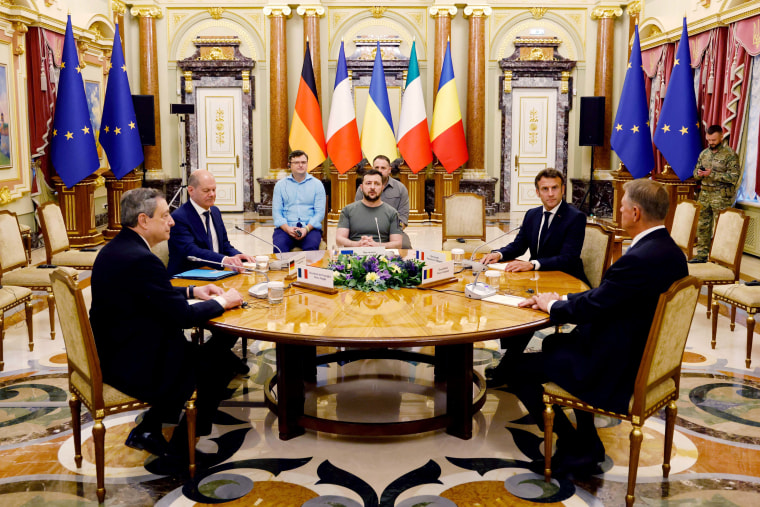The leaders of Germany, France and Italy — all criticized in the past by Kyiv for support viewed as too cautious — made a joint visit to Ukraine on Thursday, touring a town devastated by Russia's invasion.
“It’s an important moment. It’s a message of unity we’re sending to the Ukrainians,” French President Emmanuel Macron said after pulling into Kyiv on an overnight train along with Germany’s Olaf Scholz and Italy’s Mario Draghi.
Air raid sirens blared as the visit got under way. They toured the ruins of Irpin, a Kyiv suburb devastated by fighting early in the war, when Russian forces left bodies of civilians littering the streets as they withdrew.
Noting graffiti on a wall that read “Make Europe, not war,” Macron said: “It’s very moving to see that. This is the right message.”
The three leaders later vowed to back Kyiv’s candidacy to eventually join the European Union.
“My colleagues and I have come here to Kyiv today with a clear message: Ukraine belongs to the European family,” Scholz told a news conference.
The visit took weeks to organize, while the three most powerful European Union leaders all fended off criticism over positions described as too deferential to Russian President Vladimir Putin. British Prime Minister Boris Johnson visited Kyiv more than two months ago.
Still, the decision by the three to travel together held strong symbolism at a pivotal moment — a day before the E.U.’s executive commission is expected to recommend pushing forward with Ukraine’s bid to join the bloc, which E.U. leaders are expected to endorse at a summit next week.
NATO defense ministers were also meeting in Brussels and were expected to announce more promises of additional weapons for Kyiv. President Joe Biden pledged $1 billion worth of new aid Wednesday, including anti-ship rocket systems, artillery rockets and rounds for howitzers.

“Every day, I struggle for Ukraine to get the weapons and equipment it needs,” Ukrainian President Volodymyr Zelenskyy said in his nightly video address to the nation.
Ukraine applied to join the E.U. just four days after Russia invaded in February, and another four days later, Moldova and Georgia applied too.
“As of today, we are already so much closer to obtaining this status than we could have dreamed even a few years ago. Ukraine has done everything possible to become a candidate,” Zelenskyy said.
“They will say that we need to end the war that is causing food problems and economic problems ... that we need to save Mr. Putin’s face,” Oleksiy Arestovych, an adviser to Zelenskyy, told the German newspaper Bild.
NATO Secretary General Jens Stoltenberg said the alliance was “extremely focused” on stepping up support for Ukraine.
Germany’s defense minister said three multiple rocket launchers it had promised Kyiv could be delivered in July or August, once Ukrainians are trained to use them.
Kyiv says it urgently needs more weapons, especially artillery and rockets, to counter Russia’s firepower advantage. Kyiv is taking hundreds of casualties a day as the war has entered a brutal attritional phase in the east.
After Moscow launched its “special military operation” claiming its aim was to disarm and “denazify” its neighbor, Ukraine repelled an armored assault on Kyiv in March.
Since then, however, Russia has shifted both its aims and its tactics, now trying to fortify territory it occupies in the east and the south, and to seize more with slow advances behind massive artillery bombardments.
The main battle in recent weeks has been over the eastern city of Sievierodonetsk. On Wednesday, Ukrainian forces holed up in a chemical factory there with hundreds of civilians ignored a Russian order to surrender.
All remaining bridges linking the city with Ukrainian-held territory on the opposite bank of the Siverskyi Donets River were destroyed in recent days, but Ukrainian officials say the garrison is not completely cut off.
Ukraine still holds a pocket of territory in the wider eastern Donbas region, which Russia has vowed to capture on behalf of its separatist proxies. Most is on the opposite side of the river, which Russian troops have struggled to cross.
In the south, Ukrainian forces have been making slow inroads into Kherson province, the largest swath of territory Russia still holds from the areas it captured since the invasion.
